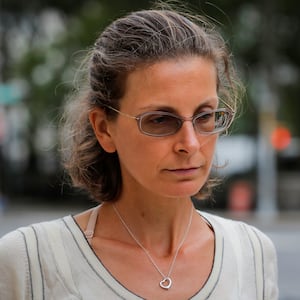A Maryland millionaire was found guilty of murder Wednesday night in connection with a 2017 fire on his property that killed a 21-year-old man who was helping him dig tunnels for his underground bunker.
Daniel Beckwitt, a 27-year-old stock broker, was charged in September 2017 with “depraved heart” second-degree murder and involuntary manslaughter in the death of 21-year-old Askia Khafra, who was working underground when the fatal fire broke out.
Prosecutors argued that while Beckwitt did not cause the fire, the “death-trap” conditions in his trash-infested Bethesda home dangerously sacrificed safety for his own sense of security, ultimately preventing Khafra from escaping in time to survive the flames.
“This is not an intentional murder,” Montgomery County prosecutor Marybeth Ayres said in her closing arguments on Tuesday, adding that Beckwitt was able to escape the home and call the police. “This was a survivable fire.”
The verdict comes after a 10-day trial in Montgomery County Circuit Court, where jurors had to decide whether the death was an accident or a crime prompted by Beckwitt’s hoarding and the extreme lengths he went to in order to ensure that his bunker—which he was building in case of a nuclear missile strike by North Korea—remained a secret. Beckwitt declined to testify in the trial.
Defense attorney Robert Bonsib, describing his millionaire client as a “very strange young man,” argued on Tuesday that the fire was merely a horrible accident and Khafra’s death was a “mystery without an answer.”
“Being different, living in a different circumstance, is not a crime,” Bonsib said in court. “An accident is not a crime.”
On Sept. 10, firefighters found Khafra’s naked, charred body steps from a hole in the concrete floor of Beckwitt’s basement, which leads to a series of tunnels about 20 feet deep. Authorities later confirmed he was killed by smoke inhalation and thermal injuries, and his death was later ruled a homicide.
Inside Beckwitt’s house, police found “immense piles of garbage and discarded items strewn throughout the entire home” and “narrow maze-like pathways” that made moving within the single-family home difficult.
The 200-foot tunnel system beneath the basement was powered with a “daisy chain” of electrical power cords. At trial, prosecutors said that Beckwitt knew this dangerous system, coupled with the hoarding conditions upstairs, increased the “likelihood of a fire breaking out”—but he prioritized secrecy over his employee’s safety.
On the day of the fire, Khafra allegedly texted Beckwitt about a “smokey” smell inside the tunnels. Six hours later, the stock trader told Khafra that there had been a “major electrical failure” underground, but not to worry because he “just switched it all over to another circuit,” Ayres said. Authorities ultimately found no evidence that another circuit existed in the house.
Bonsib argued that while Beckwitt’s project was “weird,” the tunnels were not dangerous and were not created to do anything other than protect his client from a possible apocalypse.
“They may be weird. They may look weird. But they were solid as a rock and they were a safe environment,” he said.
One of Beckwitt’s former employees, 23-year-old Douglas Hart, last week said the tunnels were not “pristine and clean,” but he felt they weren’t dangerous as there was a clear path to the bunker, which was equipped with a small refrigerator, television, WiFi, and microwave.
“I thought he was really smart and interesting,” Hart said. “I really thought he was one of the smartest people I had ever spoken to. I had an interest in being his friend.”
Beckwitt is a skilled computer hacker who has a deep fear of a possible nuclear attack by North Korea, and even spoke at a hacker convention under the name “3AlarmLampscooter” to encourage others to take similar safety precautions, prosecutors said.
In an attempt to hide his project, Beckwitt engaged in other “extreme risk-taking behavior,” prosecutors alleged during the trial, like tricking Khafra into thinking the tunnels were in Virginia instead of Maryland, forcing the 21-year-old to wear “darkened, black-out glasses that prevented [him] from seeing where they were going,” and using internet “spoofing” to make it look like they were in a different location.
But the defense argued Khafra, who met Beckwitt online, was a willing participant in the tunnel’s construction. The millionaire invested money in Khafra’s company in 2016, and in turn, Khafra was helping Beckwitt dig the tunnels on the side, often working in underground for “days at a time.”
In court, Bonsib showed selfies Khafra took while working in the tunnels. “Dude can I please work,” he wrote to Beckwitt in one message.









